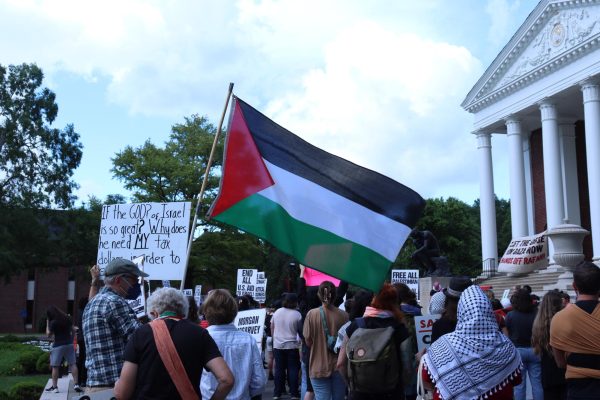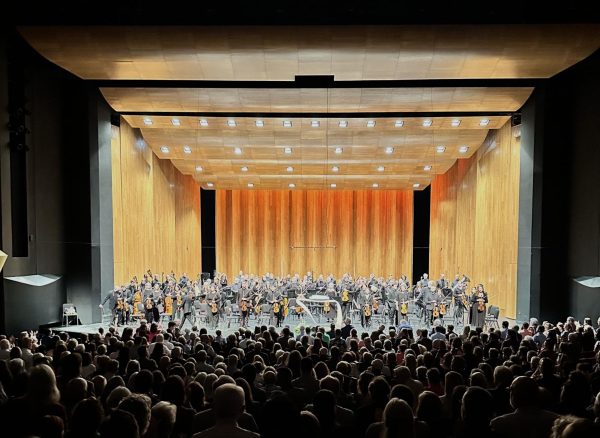OPINION: The Qatar World Cup is a crisis waiting to happen
Massive stadiums like this one have been built in only a few years in Qatar. Photo by Thomas Serer on Unsplash.
October 4, 2022
This shouldn’t have gone so poorly.
As the World Cup draws near, its location has become a primary candidate for criticism and denunciation. As the first World Cup ever held in the Middle East, having the world’s largest sporting event in Qatar should be a massive win for the expansion of soccer and development in the eastern world. Instead, from its inception it has been marred by issues involving worker’s rights and humanitarian concerns.
The FIFA World Cup is a 32-team soccer tournament that occurs every four years. It encompasses nations of all sizes and continents, but is mostly held in and dominated by European and South American teams. However, this has changed in the last decade, with South Africa holding the first World Cup in Africa in 2010. Further expansion into new lands has taken the competition into uncharted territory, Qatar.
How did a tiny oil-rich country the size of Connecticut get to host the most prestigious sporting event in the world? The answer is money.
Qatar has the highest GDP per capita of any nation, and spent roughly 200 million dollars lobbying for their World Cup nomination. The country is ruled by a powerful emir (monarch) who employs Islamic Sharia law. These countries are easier to deal with when organizing the World Cup, as they have no democratic red tape holding up progress due to small issues like worker’s lives and massive infrastructure failings.
While Islam holds principles of modesty, charity and respect, Sharia law can be manipulated by Islamic rulers to limit civil liberties and basic human rights. For example, the Qatari government bans all public non-Islamic religious gatherings and symbols, as only a few specific Christian sects are allowed to meet publicly. They also don’t recognize any religions outside of Christianity and Islam, so Buddhists and Hindus can only practice religion within their homes.
They also have banned non-Islamic religious advocacy, with a sentence of up to ten years in prison for offenders. Qatar also is against same-sex relations, as technically sodomy is a capital offense. While nobody is on record for being stoned to death for it, the sentence instead usually carries a minimum of seven years behind bars.
Despite these archaic laws, their most damaging human rights violation might be how they’ve treated the migrant workers building their World Cup stadiums. Qatar had little to no stadium or transportation infrastructure before receiving the World Cup, so they have been playing a game of high-speed catch-up even since then.
They have managed to build the 80,000 capacity Lusail and 60,000 capacity Al Bayt stadiums all within the past ten years. These stadiums didn’t just appear, however. They were primarily constructed by migrant workers from India, Sri Lanka and Bangladesh. Oftentimes, these workers have their passports revoked and live in squalid conditions.
Since Qatar was given hosting rights, 6,750 migrant workers have died within the country, mostly due to “natural” causes. However, most of these causes can be attributed to heart failure and heat stroke from working nonstop in over 100-degree weather every day. They are rarely given water or breaks, and most live bunched together in small rooms with no private space or even room to walk.
They also are barely paid, and those are the lucky ones. Most get no pay and are stuck in these terrible conditions because they have to provide for their families. They are given no education or assistance with their jobs either, causing more deaths and confusion through sheer incompetence.
This confusion stretches to the visiting fans as well, as Qatar has not been clear regarding their accommodation and other policies. For example, alcohol will only be sold before or after the games outside of stadiums, but not inside the game during it. This is because you need a permit to buy alcohol within Qatar, so for instance, if traveling fans are caught sneaking alcohol into the country, they will do prison time.
The stadiums are also in the middle of nowhere, with no easy access and no hotels or stores for miles around. There are not enough hotels in Qatar to house everyone, so many will have to either stay in the U.A.E or in small metal cabins near the stadiums.
Even some players have come out against holding the World Cup in such an oppressive environment. Germany defender Antonio Rudiger publicly voiced his criticism of the event earlier this year.
“Awarding them the World Cup was not a decision made for the fans and the players. It showed that money plays a crucial role in the world of football,” Rudiger said.


















